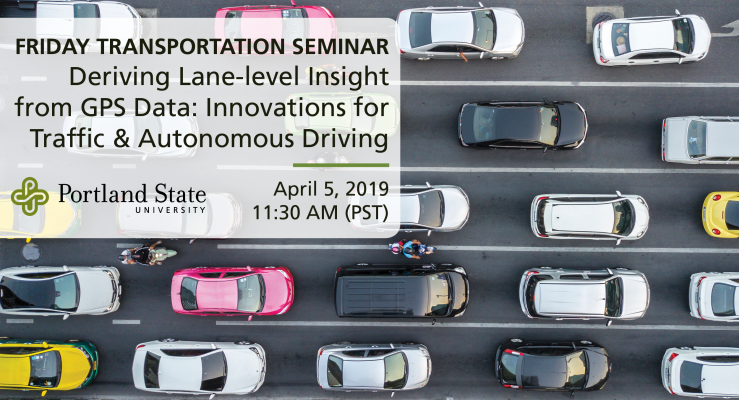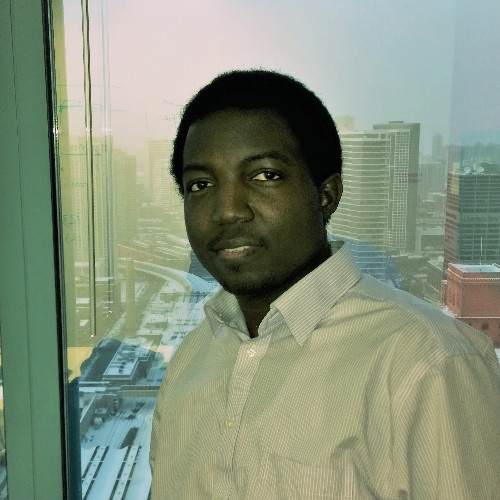
Friday Transportation Seminars at Portland State University have been a tradition since 2000. With the start of 2019, we're changing it up a bit! The seminar will be delivered 11:30 am (sharp) - 12:30 pm, with additional discussion over coffee and donuts (protect the planet—bring a mug!) from 12:30 to 1:00 pm. You can also watch online.
PRESENTATION ARCHIVE
Due to technical issues, no recording is available for this seminar.
THE TOPIC
With the on-going disruption of the transportation industry and rapid advancement in ITS technologies; emerging smart cities, navigation systems and autonomous transportation, the need for highly accurate geospatial localization has never been more crucial. These technologies demand that we have more granular location information of vehicles not just on a road, but to a specific lane on the road.
This presentation will give a pedagogical style summary and overview of some of the on-going research work at HERE Technologies and how we have pushed the state-of-the-art in lane-localization of noisy GPS probe data using novel Machine Learning Algorithms and how some of these innovations is being applied to power new products for real-time traffic, routing and navigation systems, maps for autonomous vehicles, incidents and safety services.
An example of such product is Split Lane Traffic (SLT)
Split Lane Traffic (SLT) detects divergent traffic speeds at highway junctions with exit ramps. It is the first traffic product that provides lane maneuver guidance information to drivers based on lane-level traffic conditions ahead thereby giving better navigation experience and a more accurate routing and ETA.
Other related products are: HD Live Map, Hazard Warnings and Navigation and Infotainment.
KEY LEARNING TAKEAWAYS
- Highlight the critical need for lane-level localization to enable the autonomous driving future
- Understand how Machine Learning Algorithms can be applied to GPS probe sensor analytics
- Opportunities on how to leverage HERE Technologies products and developer API platforms to power innovations for smart cities, mobility and ITS
SPEAKER
James Fowe, Principal Research Engineer, HERE Technologies
 James Fowe is a Principal Research Engineer in the Connected Vehicle Services division at HERE Technologies. As part of the Advanced Engineering Team, he leads the design and implementation of Mathematical models and Machine Learning Algorithms for location intelligence as related to real-time traffic flow, location-based AdTech, safety services and HD Maps for Autonomous driving. More recently James has been pioneering cutting edge research focused on deriving lane-level granularity from noisy GPS probe data. This includes lane-level map-matching, lane-level traffic, lane-closures and lane-connectivity in high definition maps. James has been involved with ITS research for over a decade and has invented several key technologies in the field with over 50 US patents filed and a few academic research paper publications.
James Fowe is a Principal Research Engineer in the Connected Vehicle Services division at HERE Technologies. As part of the Advanced Engineering Team, he leads the design and implementation of Mathematical models and Machine Learning Algorithms for location intelligence as related to real-time traffic flow, location-based AdTech, safety services and HD Maps for Autonomous driving. More recently James has been pioneering cutting edge research focused on deriving lane-level granularity from noisy GPS probe data. This includes lane-level map-matching, lane-level traffic, lane-closures and lane-connectivity in high definition maps. James has been involved with ITS research for over a decade and has invented several key technologies in the field with over 50 US patents filed and a few academic research paper publications.
PROFESSIONAL DEVELOPMENT
This 60-minute seminar is eligible for 1 hour of professional development credit for AICP (see our provider summary). We provide an electronic attendance certificate for other types of certification maintenance.
LEARN MORE
Sign up for our newsletter to receive monthly updates.
James Fowe is a visiting scholar, brought to Portland State University with support from the National Institute for Transportation and Communities (NITC). The Transportation Research and Education Center (TREC) at Portland State University is home to the National Institute for Transportation and Communities (NITC), the Initiative for Bicycle and Pedestrian Innovation (IBPI), and other transportation programs. TREC produces research and tools for transportation decision makers, develops K-12 curriculum to expand the diversity and capacity of the workforce, and engages students and young professionals through education.
